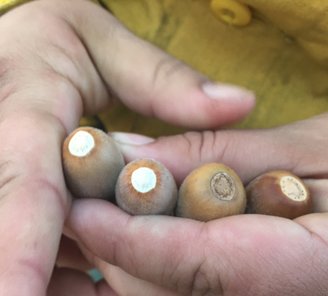Nancy Bailey thinks it’s time for Smokey Bear to retire. Like all American children of the last three quarters of a century, she grew up with Smokey hammering his “Only YOU Can Prevent Forest Fires” slogan into her skull. She can see the effect he’s had over the past few generations.
“Over the years he’s instilled this fear of fire in every child in the country,” Bailey says.
A concoction of the Ad Council, the authoritarian bear served to reinforce the U.S. Forest Service’s near century-long policy of fire suppression — no fires at all, thank you — an approach that left forests dense with underbrush. But in more recent years, as larger wildfires have increased, that practice has been reevaluated and there has been a push to return to more traditional fire policies, those practiced by local tribes for generations.
So while Bailey believes Smokey has had a positive influence on the kids she wishes he would switch up his game a bit. Because there is such a thing as “good fire.”
“Smokey Bear is here to stay, but his message needs to change,” she says.
Earlier this month, while the most destructive fires in California’s history raged to the south, Bailey, an Orleans resident and the co-director of the Mid Klamath Watershed Council (MKWC) Fires and Fuels Program was part of the multi-agency team that helped facilitate the Klamath Prescribed Fire Training Exchange (Klamath TREX), an annual exercise that saw near 100 people — from fire rookies to seasoned veterans — participate in large controlled burns aimed at reducing fuel-dense forests of the Western Klamath Mountains.
# # #
Vikki Preston, Archeological and Cultural Resources Technician for the Karuk Tribe, grew up in the Orleans area and considers prescribed burning to be a part of her heritage. She remembers how, when she was a small child, every year her grandparents would use drip torches to dutifully burn the land around their house. Over time she too learned to intuitively recognize conditions indicating it was a good time to burn.
“You start to create this memory bank of the areas and what they’re doing and how they’re reacting to what you’re doing in them,” Preston said. “You start to see the changes.”
She hopes that that TREX will help educate the community on the benefits of prescribed burns.
“If you haven’t experienced something there’s more of a chance you’ll fear it,” Preston said.

Tan oak acorns: Lighter is better
The same day we observed the Klamath TREX burn operations lucky field trippers from Junction Elementary School also attended. After a period absorbing traditional ecological knowledge via some up-close-and-personal fire time, the kids were taken to a site that had been cleared out as part of last year’s TREX to learn one reason why fire has been historically important to the Karuk tribe: it makes it much easier to collect acorns.
Tan oak acorns are a staple of the Karuk tribe’s diet — acorn soup is used in Karuk ceremonies — and they’re much easier to gather if you don’t have to wade through dense underbrush. Plus, gathering acorns means there will be less tree sprouts next season.
“Traditionally this would be your main food, so if you wanted to eat you had to make sure your gathering places were nice,” Preston says. She held a few acorns in her hand and pointed out that the ones that had the lighter tips were best for eating — they’re denser and likely don’t have bugs in them.
# # #
At the end this year’s TREX, after all was said and singed, Terence reported that participants burned a total of 310.5 acres and also prepped more than 700 acres for future burns. Despite some unforeseen obstacles — including California’s disaster declaration which caused them to call off the last few burn days — she was pleased with what they accomplished, especially with the number of locals who took part who’ll now be better equipped to manage future fires, prescribed or wild.
“We believe this model is the only way to truly protect communities from the uncertain fire future we are facing,” Terence said.
Assuming there’s no snag obtaining necessary permits and funding Klamath TREX should return next year. If you are interested in getting involved or in more information get yourself on the TREX announcement list by emailing mail@mkwc.org.
CLICK TO MANAGE